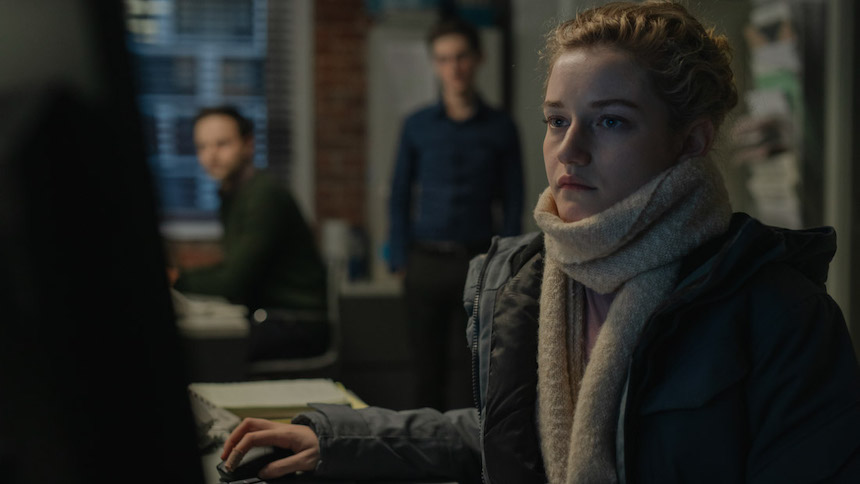Sundance 2020 Review: THE ASSISTANT Delivers a Master Class in Corporate Complicity
Julia Garner stars in writer-director Kitty Green's ominous, chilling drama.

Before the #MeToo movement, über-producer Harvey Weinstein operated with complete impunity, free of consequence or accountability, repeatedly abusing his position as an über-producer and production executive to harass, extort, and sexually assault the women who crossed his path. But the #MeToo movement changed everything, at least for Weinstein and the civil suits and criminal complaints that followed.
While his day in court stretches into weeks and months, writer-director Kitty Green’s (Casting JonBenet, Ukraine is Not a Brothel) astute, insightful character study/corporate critique, The Assistant, makes a timely, zeitgeist-reflecting arrival in movie theaters. The Assistant answers a key question surrounding Weinstein’s decades-long reign of terror, if not necessarily the why (presumed), then the how, namely, how Weinstein held onto a powerful position for so long without any legal or professional repercussions.
We never actually meet the fictionalized Weinstein in The Assistant. He’s a voice behind a door, a voice on the phone, or a shadowy figure moving clumsily behind a set of blinds. For Jane (Julie Garner), a recent Northwestern grad, her dream of one day becoming a Hollywood producer begins with 12-hour shifts (plus weekends) as a low-level assistant to the Weinstein stand-in. She starts and ends her day in the dark, with a car-share service that drops her off at the production office before anyone else.
Green’s camera non-judgmentally observes Jane as she goes through her everyday, mundane, routine, cleaning the office, prepping coffee and drinks, and printing out scripts and other files for the executives. Green introduces the first of many ominous notes: Jane finds a single earring in the production executive’s office (obviously not his wife’s).
As the other, male assistants enter and begin their day, it becomes just as obvious that Jane occupies the bottommost position in a rigid social hierarchy. They leave anything they can’t and won’t do for Jane, up to and including increasingly hysterical calls from their collective boss’ wife (because she’s a woman) or ferrying another, newly arrived assistant, Sienna (Kristine Froseth), to a lavish hotel room.
Gradually, step by methodical step, Green lays out the unseen system of rules that regulates the professional and personal lives of everyone around her built around a combination of willful ignorance/blindness and self-interest (i.e., see/say nothing in exchange for career advancement) that collectively equal the kind of enablement culture that allows monstrous men like Weinstein to survive and thrive.
Enablement culture also requires complicity, the willing active or passive participation of everyone involved, from the senior-most executive to an entry-level assistant like Jane, gradually, almost imperceptibly eroding and erasing ethical and moral standards. Green gives Jane multiple moments, some smaller than others, where Jane can turn away or simply say no (except it’s not so simple), but each time, external pressures incentivize Jane to go along to get along.
In The Assistant’s most stealthily chilling scene, a moment of moral clarity leads Jane to the office of the human resources director. Like everyone above and around her, he’s internalized the rationales, the excuses, the obfuscations necessary to do absolutely nothing that might upset the Weinstein stand-in who seems to have the power of life or death (professionally speaking) over everyone else in the company.
Green depends heavily on Julie Garner’s performance to convey Jane’s ever-roiling, troubled psyche, moving from semi-asleep drone to conscience-stricken employee (and back again) over the course of The Assistant’s brief, 90-minute running time. Jane’s natural reserve as an insecure twenty-something moving into the workforce for the first time in her professional life often leaves her with practically little to do and even less to do except observe events from a cool, detached distance.
Jane’s constricted movements and experiences put a considerable burden on Garner to evoke Jane’s inner life, her shifting mental and emotional state, with an admirably minimalist acting style. In the hands of a less assured or less talented actress, Jane could have easily slipped into an unsympathetic cipher. That she doesn’t is a credit to both Garner’s nuanced, layered performance and Green’s precisely calibrated direction.







